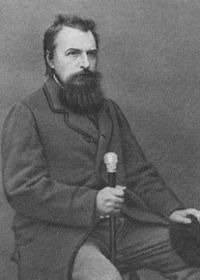Potschwennitschestvo
Potschwennitschestvo ( Russian : Почвенничество, roughly: "return to the ground") was a movement within the Russian Slavophile movement of the 19th century. In contrast to other Slavophiles, the Potschwenniki did not reject the West in toto , but sought a synthesis of Russian culture and Western thinking. The movement was founded by Nikolai Strachow , Nikolai Danilewski and Konstantin Leontjew , but Apollon Grigoryev soon became its leading thinker and spokesman . Even Fyodor Dostoevsky clung to her.
history
Like the rest of the Slavophile movement, Potzhnichestvo was a reaction to the westernization of Russia, which began with the reforms of Peter I in the 18th century. The Potschwenniki saw the rural community as the epitome of Russian . However, they did not want to shield them from Western influence, but rather to reconcile the two. They sharply rejected the anti-individualism of the other Slavophiles.
From 1861 to 1865, Dostoevsky made his magazines Vremja and Epocha available to the movement. After he had turned away from early socialism in the Siberian exile , he believed in a peaceful transformation of society, the prerequisite for which was that the western upper class or intelligentsia restore their roots in the simple Russian people. Both are powerfully connected to one another through the Christian faith and, after their reconciliation, would jointly participate in the organic development of Russia. Grigoryev envisioned an increasingly democratic, classless nation in which the nobility and the lower classes were equal partners. A powerful role was played by art , whose task Grigoryev saw in the image of the idea of a reconciled Russian society. The Potschwenniki also criticized the other Slavophiles because of their idealization of the Russian peasantry, which, according to their own opinion, should learn from the upper class just as the latter should learn from the former.
In his novel The Demons, Dostoyevsky articulated Potschwennitschestvo through the character of Shatov.
The movement revived again at the end of the 19th century, and again in the 20th century, but both times with accents that had evolved strongly from Grigoryev's position.
literature
- Fyodor M. Dostojewski: Два лагеря теоретиков (Two camps of theorists) . In: Wremja . tape 2 , no. 2 , 1862, p. 143-163 (Russian, original Russian text [accessed December 2, 2013]).
Individual evidence
- ^ A b Kate A. Baldwin: Beyond the Color Line and the Iron Curtain . Reading Encounters Between Black. Duke University Press, 2002, pp. 25 ( limited preview in Google Book search).
- ↑ a b Joseph Frank: Dostoevsky . The Stir of Liberation, 1860-1865. Princeton University Press, Princeton, New Jersey 1986, ISBN 0-691-01452-3 , pp. 34 ( limited preview in Google Book search).
- ↑ a b Alexander Burry: Multi-Mediated Dostoevsky . Transposing Novels Into Opera, Film, and Drama. Northwestern University Press, Evanston, Illinois 2011, ISBN 978-0-8101-2715-9 , pp. 81 ( limited preview in Google Book search).
- ^ Elena M. Katz: Neither with Them, Nor Without Them . The Russian Writer and the Jew in the Age of Realism. Syracuse University Press, Syracuse, New York 2008, ISBN 978-0-8156-3182-8 , pp. 152 ( limited preview in Google Book search).
- ↑ Ludmilla Voitkovska: A View from the East . The Russian Reception of “Under Western Eyes”. In: Allan H. Simmons, JH Stape, Jeremy Hawthorne (Eds.): Under Western Eyes . Centennial Essays. 2011, ISBN 978-90-420-3440-2 , pp. 153 f . ( limited preview in Google Book search).
- ↑ Lina Steiner: For Humanity's Sake . The Bildungsroman in Russian Culture. University of Toronto Press, Toronto 2011, ISBN 978-1-4426-4343-7 , pp. 52 f . ( limited preview in Google Book search).
